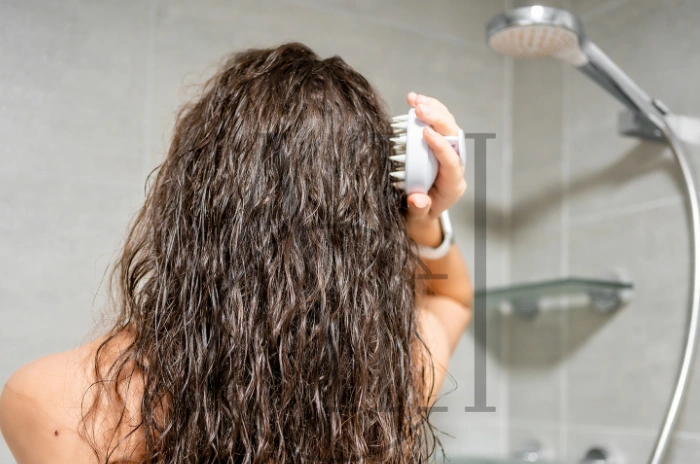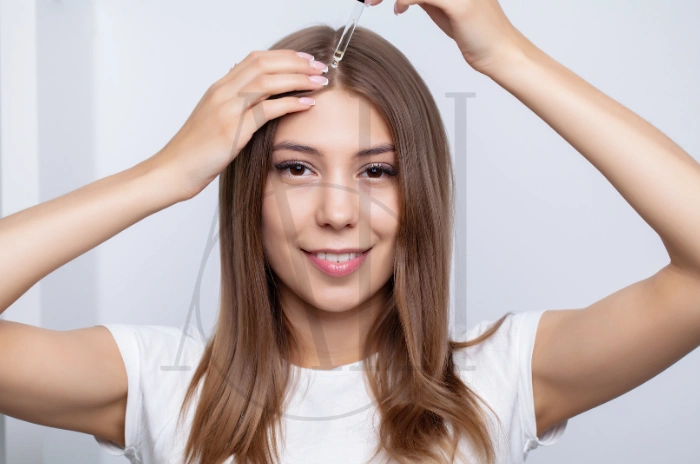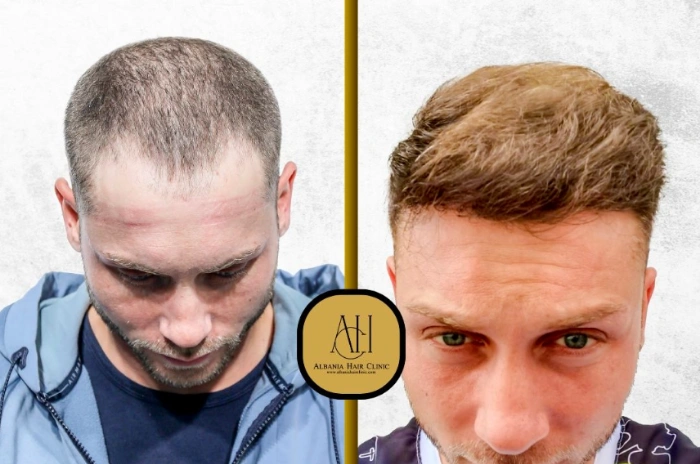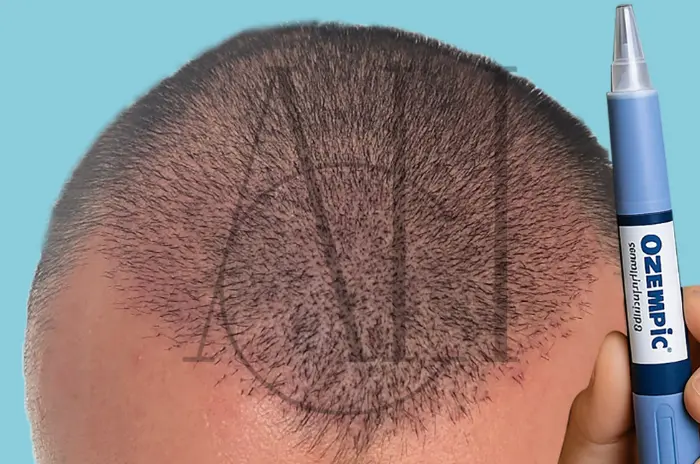Struggling with thin, lifeless hair can be frustrating, especially when you dream of having thick, voluminous locks. Many people believe that hair thickness is purely genetic, but the truth is that you can significantly improve your hair’s density and volume through natural methods. Learning how to make your hair thicker naturally involves understanding the right combination of vitamins, oils, and proper hair care techniques.
The journey to thicker hair doesn’t require expensive salon treatments or harsh chemicals. With the right approach using vitamins for hair thickness and nourishing oils, you can transform your hair from thin and weak to strong and voluminous. This comprehensive guide will explore proven methods, from DIY hair thickening treatments to lifestyle changes that support healthy hair growth.
Table of Contents
ToggleWhat Causes Hair to Become Thin?
Understanding the root causes of hair thinning is essential for choosing the most effective treatment approach. Hair thinning rarely happens overnight and is usually the result of multiple factors working together over time.
| Hair Thickness Factor | Natural Solution | Expected Timeline |
|---|---|---|
| Vitamin Deficiency | Biotin, Iron, Vitamin D supplements | 3-6 months |
| Poor Scalp Health | Scalp massage with essential oils | 2-4 weeks |
| Damaged Hair | DIY hair masks and protein treatments | 4-8 weeks |
| Product Buildup | Thickening shampoo and clarifying | 1-2 weeks |
| Styling Damage | Heat protection and gentle techniques | 6-12 weeks |
Common reasons for hair thinning
Hair thinning can occur due to various internal and external factors. Hormonal changes, particularly during menopause, pregnancy, or thyroid disorders, significantly impact hair density. Rapid weight loss hair loss is another common cause, as sudden dietary restrictions can deprive hair follicles of essential nutrients they need to produce strong, thick strands.
Environmental factors also play a crucial role in hair health. Excessive heat styling, chemical treatments, and pollution can weaken hair shafts, making them prone to breakage. Poor nutrition, chronic stress, and certain medications can disrupt the natural hair growth cycle, leading to gradual thinning over time.
Age-related changes in hormone levels naturally slow down hair production and reduce the diameter of individual strands. Additionally, some autoimmune conditions and scalp infections can create inflammation that interferes with healthy hair growth, resulting in noticeable thinning patterns.
How hair texture and genetics play a role
Genetics determine your baseline hair characteristics, including strand diameter, growth rate, and overall density. Some people are naturally born with finer hair strands, which can make their hair appear less voluminous even when healthy. However, genetic predisposition doesn’t mean you’re powerless to improve your hair’s thickness.
Hair texture varies significantly between individuals, with some having naturally coarse, thick strands while others have fine, delicate hair. Fine hair can be healthy and strong but may appear thin due to smaller strand diameter. Understanding your natural hair texture helps you choose appropriate thin hair solutions and realistic expectations for improvement.
Even with genetic factors at play, proper nutrition, gentle care, and targeted treatments can maximize your hair’s potential thickness. Many people with naturally fine hair successfully achieve fuller-looking results through consistent use of volumizing hair products and proper styling techniques.
How to Make Your Hair Thicker Naturally
Natural approaches to increasing hair thickness focus on nourishing hair follicles from both inside and outside. These methods work gradually but provide lasting results without the side effects associated with chemical treatments.
Essential Vitamins and Nutrients for Thicker Hair
Vitamins for hair thickness play a fundamental role in supporting healthy hair growth and increasing strand diameter. Biotin, also known as vitamin B7, helps produce keratin, the protein that makes up hair strands. Vitamin D deficiency has been linked to hair thinning, as this vitamin helps create new hair follicles.
Iron is equally important, as low iron levels can cause hair to become thin and brittle. Vitamin C aids in iron absorption and collagen production. Omega-3 fatty acids help nourish hair follicles and promote shine and thickness. B-complex vitamins support proper circulation to the scalp and help transport nutrients to hair follicles.
| Essential Vitamin | Daily Dosage | Hair Thickness Benefit |
|---|---|---|
| Biotin | 30-100 mcg | Strengthens keratin structure |
| Iron | 18 mg (women) | Prevents hair thinning |
| Vitamin D | 1000-2000 IU | Creates new follicles |
| Omega-3 | 1000 mg | Nourishes and adds shine |
| Vitamin C | 90 mg | Improves iron absorption |
Best Oils to Boost Hair Thickness
Best oils for thick hair can transform thin, weak strands into stronger, more voluminous hair when used regularly. Castor oil stands out due to its high concentration of ricinoleic acid, which improves blood circulation to the scalp and promotes hair growth.
Rosemary oil has been scientifically proven to be as effective as minoxidil for promoting hair growth. Coconut oil penetrates the hair shaft better than most other oils, providing deep nourishment and protection against protein loss. Argan oil helps repair damaged hair cuticles and adds natural volume.
DIY Hair Masks for Thicker, Stronger Hair
Creating DIY hair thickening treatments at home allows you to customize ingredients based on your specific hair needs. A popular mask combines eggs (rich in protein), honey for moisture, and olive oil for nourishment.
The egg and avocado mask provides intense protein treatment for weak, thin hair. Mash one ripe avocado with two egg yolks, apply to clean hair, and leave for 30 minutes. This treatment strengthens hair shafts and adds natural volume.

Daily Habits for Thicker, Healthier Hair
Scalp Massage Techniques to Stimulate Growth
Scalp massage for growth increases blood circulation to hair follicles, delivering more nutrients and oxygen to support healthy growth. Spend 5-10 minutes daily massaging your scalp with your fingertips using circular motions.
Adding essential oils enhances the benefits. Mix rosemary or peppermint oil with a carrier oil like jojoba. The combination of massage and therapeutic oils creates an ideal environment for hair growth and improved thickness.
How to Choose the Right Shampoo for Thick Hair
Thickening shampoo products should be sulfate-free formulas that clean gently without stripping natural oils. Volumizing hair products should contain ingredients like biotin, keratin, or rice protein that temporarily coat hair strands.
Avoid shampoos with heavy moisturizing agents that can weigh down fine hair. Use clarifying shampoos weekly to remove product buildup, but balance with gentle formulas for daily washing.
Foods That Promote Hair Thickness
Foods for thicker hair provide essential building blocks for strong, healthy hair growth. Protein-rich foods like eggs, fish, and legumes supply amino acids that form hair structure.
Leafy green vegetables provide iron, folate, and vitamins A and C. Nuts and seeds offer healthy fats, vitamin E, and zinc. Sweet potatoes provide beta-carotene, which converts to vitamin A for healthy sebum production.
Common Mistakes That Prevent Hair Thickness
Overwashing and Heat Damage – What to Avoid
Excessive washing strips natural oils that protect hair, leading to dryness and breakage. Most hair types benefit from washing every other day. Heat styling tools can severely damage hair cuticles, making strands weak and prone to breakage.
When heat styling is necessary, always use thermal protectant spray and keep temperatures below 350°F. Allow hair to air dry partially before using hot tools, and consider heat-free styling methods.
Why Tight Hairstyles Can Cause Thinning
Frequent tight hairstyles create constant tension on hair follicles, leading to traction alopecia. Tight ponytails, braids, and buns pull on hair roots continuously, weakening follicles and eventually causing permanent damage.
Vary your hairstyles daily and use soft hair ties without metal clasps. Give your hair regular breaks by wearing it loose, especially while sleeping.
Professional Treatments for Thicker Hair
When to Consider Supplements for Hair Growth
Hair loss prevention tips often include targeted supplementation when dietary sources don’t provide adequate nutrients. A comprehensive hair vitamin should contain biotin, iron, vitamin D, and B-complex vitamins.
Consult with a healthcare provider before starting supplements, particularly if you have health conditions. Blood tests can identify specific deficiencies contributing to hair thinning.
Salon Treatments That Enhance Hair Volume
Professional scalp treatments can deep-clean follicles and stimulate circulation more effectively than home care. Hair treatment for thin hair options include protein treatments that temporarily thicken strands and keratin treatments for fuller appearance.
Low-level laser therapy uses specific light wavelengths to stimulate hair follicles. Many people experience increased hair density after several months of regular treatments.
How to Use Hair Products for Thicker Hair
Benefits of thickening shampoo and conditioner
Thickening shampoo and conditioner systems coat hair strands with proteins and polymers that temporarily increase diameter. These products contain hydrolyzed proteins that fill gaps in damaged cuticles, making strands appear smoother and thicker.
Focus shampoo on scalp and roots while applying conditioner to mid-lengths and ends. This prevents conditioning agents from weighing down roots where volume is most important.
| Product Type | Application Method | Hair Thickness Benefit |
|---|---|---|
| Thickening Shampoo | Focus on scalp and roots | Removes buildup, adds volume |
| Volumizing Conditioner | Mid-lengths to ends only | Moisturizes without weighing down |
| Volume Mousse | Damp hair, roots to ends | Creates lift and texture |
| Hair Serum | Damp hair before styling | Protects and smooths cuticles |
How a volume-boosting mousse helps your hair
Volume-boosting mousse provides lift at roots while adding texture throughout the hair shaft. Apply to damp hair from roots to ends, then blow-dry while lifting sections away from the scalp for maximum volume.
When to apply hair serum and leave-in treatments
Apply hair serum and leave-in treatments to damp hair before styling for protection throughout the day. Focus on mid-lengths and ends where hair is oldest and most vulnerable to damage.

Lifestyle Changes That Support Hair Growth
How diet affects hair volume
Diet for thicker hair should emphasize whole foods rich in protein, healthy fats, and essential vitamins. Hair follicles require consistent nutrient supply for optimal function. Include lean meats, fish, eggs, and legumes for adequate amino acids.
Hydration plays a crucial role in hair health. Aim for adequate water intake and consider foods with high water content. Avoid crash diets and extreme calorie restriction, as rapid weight loss hair loss can trigger widespread shedding.
Reducing stress to prevent hair thinning
Chronic stress elevates cortisol levels, disrupting hair growth cycles and leading to increased shedding. Regular exercise helps reduce stress hormones while improving scalp circulation.
Adequate sleep is crucial for hair health, as growth and repair processes occur during rest. Aim for 7-9 hours nightly and consider silk pillowcases to reduce friction.
Styling Techniques to Make Hair Look Thicker
The power of blow-drying and brushing techniques
Proper blow-drying technique adds significant volume and creates thicker-looking hair. Always blow-dry in the direction opposite to natural growth pattern for maximum root lift.
Use a round brush to lift sections away from scalp while directing heat from roots to ends. Cool air finishing helps set the style and adds shine that makes hair appear fuller.
Why a haircut can add visible volume
Strategic haircuts dramatically improve thickness appearance by removing damaged ends and creating volume-maximizing shapes. Blunt cuts typically make hair appear thicker than layered styles.
Regular trims every 6-8 weeks prevent split ends from traveling up the hair shaft. Healthy ends create the illusion of overall hair health and thickness.
Hair Care Routine for Thicker Locks
How to Choose the Right Shampoo for Volume
Fine hair benefits from lightweight formulas that cleanse without weighing down strands. Volumizing hair products should contain ingredients that temporarily plump hair strands without causing buildup.
Avoid shampoos with heavy moisturizing agents if your goal is volume. Consider clarifying shampoos weekly to remove buildup while balancing with gentle formulas for regular washing.
Styling Tips to Make Hair Look Thicker
Fix thinning hair appearance by changing your part regularly to prevent scalp from showing through consistently. A slightly off-center part often creates more volume than severe center or side parts.
Texturizing sprays and dry shampoos add grip and volume to fine hair. Apply to clean, dry hair and work through with fingers for natural-looking texture.
Why Conditioner Matters for Hair Thickness
Proper conditioning prevents breakage that can make hair appear thinner over time. Choose lightweight, volumizing conditioners for fine hair, applying to mid-lengths and ends while avoiding roots.
Deep conditioning treatments should be used weekly for damaged hair to maintain strength. Strong, healthy hair always appears thicker than damaged, brittle strands.
FAQ : How to Make Your Hair Thicker Naturally with Vitamins and Oils
What causes hair to become thin?
Hair thinning is typically caused by genetics, hormonal changes, nutritional deficiencies, stress, damage from heat styling or chemical treatments, certain medications, and age-related changes in hair follicle function.
Can I make my hair thicker naturally?
Yes, you can improve hair thickness naturally through proper nutrition, scalp massage for hair growth, using nourishing oils like castor and rosemary oil, avoiding damaging practices, and maintaining a healthy lifestyle with adequate sleep and stress management.
What are the best vitamins and nutrients for thicker hair?
The most important vitamins for hair thickness include biotin, vitamin D, iron, vitamin C, omega-3 fatty acids, zinc, and B-complex vitamins, which support keratin production, follicle health, and proper hair growth cycles.
How can I manage or prevent hair thinning with daily habits?
Daily habits that prevent hair thinning include gentle hair handling, using thickening shampoo, regular scalp massage, protecting hair from heat damage, eating a balanced diet, managing stress, and avoiding tight hairstyles that create tension.
How do thickening shampoos and conditioners work?
Thickening shampoo and conditioner work by coating hair strands with proteins and polymers that temporarily increase diameter, while removing excess oils and buildup that can weigh hair down and make it appear thinner.
What are some professional treatments for thicker hair?
Professional treatments include scalp treatments for deep cleansing, protein treatments, keratin treatments, microneedling, low-level laser therapy, and targeted supplements recommended by healthcare providers for specific deficiencies.
How can I style my hair to make it look thicker?
Style hair to appear thicker by blow-drying with a round brush for root lift, using volumizing hair products, changing your part regularly, avoiding over-brushing, and choosing strategic haircuts that maximize apparent density.
Is stress a major factor in hair thinning?
Yes, chronic stress significantly impacts hair thickness by elevating cortisol levels, disrupting hair growth cycles, causing premature shedding, and potentially triggering conditions like telogen effluvium that result in widespread hair loss.






